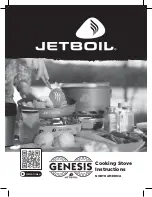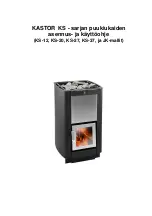
24
Distances to flammable materials using UNINSULATED fluepipes*
100mm behind the stove to flammable material
700mm beside the stove to flammable material
520mm behind/beside if mounted 45° in a corner
1100mm in front of the stove to flammable material
TT23RG/ TT23RGS
TT23RG/ TT23RGS
520
520
1046
1273
1100
100
700
960
283
1100
490
490
1003
1230
1100
50
700
960
233
1100
Distances to flammable materials using INSULATED fluepipes*
50mm behind the stove to flammable material
700mm beside the stove to flammable material
490mm behind/beside if mounted 45° in a corner
1100mm in front of the stove to flammable material
TT23RG/ TT23RGS
TT23RG/ TT23RGS
520
520
1046
1273
1100
100
700
960
283
1100
490
490
1003
1230
1100
50
700
960
233
1100
*These distances only apply to the stove. Other distances apply to fluepipes
Distance to non-flammable materials
It is recommended that there is a minimum of 50-100 mm behind and beside the stove so the
stove can dispose of the heat, this distance makes cleaning of and around the stove easier. In ad-
dition, refer to the relevant Building Regulations.
Requirements for the chimney
The chimney must be of sufficient height so the draught conditions are okay the smoke does
not bother anyone. Good draught in the chimney is crucial to the stove working as intended and
burns as environmentally friendly as possible. The height of the chimney must typically be a mini-
mum of 3.5 m from the top of the stove to the top of the chimney.
The chimney must have a minimum internal diameter of Ø150mm.
The chimney must be equipped with an easily accessible cleaning hatch. All joints and connec-
tions must be tight and the chimney must be able to provide a draught of at least 1.2 mm water
gauge (12Pa).
It is possible to connect the wood-burning stove to chimneys that are also used for other purpo-
ses. However, the concrete conditions must be assessed by the fitter and/or chimney sweeper.
If the stove is to be mounted with back/rear exit the following is done:
The round, welded or screwed cover plate at the back of the stove is removed. Then the cut-out
piece on the base-plate is removed (the thin division plate). Be careful not to drop the piece bet-
ween the back plate and the stove! This is best done with a screwdriver / chisel or pliers.
Finally the screwed smoke cover is removed and then the exhaust branch can be mounted.
Remember to fix the smoke cover at the top of the stove before use.
Demands for the floor:
The foundation must be able to bear the stove and possibly the chimney’s weight.
















































